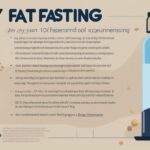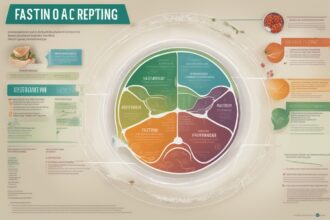Have you ever wondered how your body cleanses itself at a cellular level, getting rid of damaged parts and rejuvenating like a spring cleaning for your cells? That’s where fasting autophagy comes into play—a fascinating biological process that’s gaining attention in the health and wellness world. When you practice intermittent fasting or extended fasting, your body can trigger autophagy, a natural mechanism that helps repair and recycle cellular components. In this post, we’ll explore what autophagy is, how fasting triggers it, its incredible health benefits, and how you can harness this process to optimize your well-being. Let’s dive into the science and practical steps to unlock the power of cellular renewal!
What Is Autophagy and Why Does It Matter?
Autophagy, derived from the Greek words for “self-eating,” is your body’s way of cleaning house at the cellular level. It’s a process where cells break down and recycle damaged proteins, organelles, and other waste materials. Think of it as a built-in recycling system that keeps your cells functioning efficiently. When autophagy is active, it helps prevent the buildup of cellular junk, which can lead to inflammation, aging, and diseases like cancer or Alzheimer’s. The connection between fasting and autophagy is particularly exciting because fasting acts as a powerful trigger for this process, pushing your body into a state of repair and renewal. Understanding this link can help you make informed choices about your fasting routine for maximum health benefits.
How Does Fasting Trigger Autophagy?
The magic of fasting autophagy lies in how nutrient deprivation forces your body to shift gears. When you eat, your body focuses on digesting and storing energy. But when you fast—whether it’s through intermittent fasting (like the 16:8 method) or longer fasts—your insulin levels drop, and your body starts looking for alternative energy sources. This metabolic stress signals cells to activate autophagy to break down unnecessary components for fuel. Research shows that autophagy ramps up significantly after 12–16 hours of fasting, with even greater effects during prolonged fasts of 24–48 hours. This is why many health enthusiasts incorporate fasting into their routines to boost cellular cleanup and promote longevity.
Key Health Benefits of Fasting-Induced Autophagy
The benefits of autophagy through fasting extend far beyond just a tidy cellular environment. Scientists have linked this process to a host of health improvements that can transform how you feel and age. Here are some of the standout advantages:
- Anti-Aging Effects: Autophagy helps clear out damaged cells, reducing oxidative stress and slowing the aging process at a cellular level.
- Improved Brain Health: By removing toxic proteins, autophagy may lower the risk of neurodegenerative diseases like Parkinson’s and Alzheimer’s.
- Enhanced Immune Function: Recycling old cellular components strengthens your immune system, helping your body fight infections more effectively.
- Reduced Inflammation: Autophagy curbs chronic inflammation, a root cause of many modern diseases like diabetes and heart disease.
- Potential Cancer Protection: Early research suggests autophagy can prevent the growth of cancerous cells by eliminating damaged DNA.
These benefits highlight why combining fasting with autophagy is such a powerful tool for long-term health. It’s like giving your body a reset button!
Practical Tips to Activate Autophagy Through Fasting
Ready to tap into the benefits of fasting autophagy? You don’t need to be a scientist or a fasting guru to get started. With a few simple strategies, you can encourage your body to kickstart this cellular cleanup process. Here are some actionable tips to integrate into your lifestyle:
- Start with Intermittent Fasting: Try the 16:8 method—fast for 16 hours and eat during an 8-hour window. This often triggers mild autophagy after 12–14 hours.
- Extend Fasting Periods Gradually: Once you’re comfortable, experiment with 24-hour fasts once or twice a month to amplify autophagy effects.
- Stay Hydrated: Drink plenty of water during fasting to support detoxification and keep your body functioning optimally.
- Limit Protein Intake: Excessive protein can inhibit autophagy by stimulating mTOR (a growth pathway). Focus on moderate protein during eating windows.
Remember, consistency is key. Start small, listen to your body, and consult a healthcare professional if you have underlying conditions before diving into extended fasting for autophagy.
The Science Behind Fasting and Autophagy: What Research Says
The connection between fasting and cellular renewal isn’t just hype—it’s backed by solid science. In 2016, Japanese scientist Yoshinori Ohsumi won the Nobel Prize in Physiology or Medicine for his groundbreaking work on autophagy, shedding light on how cells recycle waste. Studies since then have shown that fasting significantly upregulates autophagy by lowering insulin and activating pathways like AMPK, which signal cells to start cleaning up. Research also indicates that autophagy fasting benefits peak during longer fasts, though even short-term fasting can have a positive impact. While human studies are still evolving, animal research consistently demonstrates that fasting-induced autophagy extends lifespan and protects against age-related diseases. This growing body of evidence underscores why fasting is more than a weight-loss trend—it’s a pathway to deeper cellular health.
Common Myths and Precautions About Fasting Autophagy
While the buzz around fasting autophagy is well-deserved, there are some myths and misconceptions to clear up. For instance, some believe that autophagy only happens during extreme fasting, but even moderate fasting can stimulate it. Another myth is that fasting is a cure-all—while it’s powerful, autophagy isn’t a magic bullet and works best alongside a balanced diet and healthy lifestyle. On the precaution side, fasting isn’t suitable for everyone. Pregnant women, individuals with eating disorders, or those with certain medical conditions should avoid fasting without medical guidance. Overdoing fasting can also lead to fatigue or nutrient deficiencies, so balance is crucial. Always prioritize safety and personalize your approach to fasting for cellular health.
In wrapping up, fasting autophagy offers a remarkable window into how our bodies can heal and renew themselves when given the right conditions. By incorporating fasting into your routine—whether through intermittent fasting or occasional longer fasts—you can tap into this natural process to support anti-aging, brain health, and overall wellness. The science is clear: autophagy is a cornerstone of cellular health, and fasting is one of the most accessible ways to activate it. So, why not give it a try? Start with small fasting windows, stay mindful of your body’s signals, and watch how this ancient practice can bring modern health benefits. Have you tried fasting to boost autophagy? Share your experiences or questions in the comments—I’d love to hear from you!






